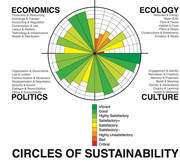| Directions: Use information from the following articles (or other articles you find online - if you do find other bits of information please provide a more full citation in your response or link to the article) to answer the prompt below. Create one original post with your own answer to the prompt with reference to at least one article (cite the article in your response by including the name of the author in parentheses ex. (Hickel)). You will also need to post a response to a classmate's post with a refuting argument (again citing information from an appropriate article). |
- Dr. Jason Hickel, Five Reasons to Think Twice About the UN's Sustainable Development Goals
- Dr. Kathleen Smyth, A Historian's Critique of Sustainability (pgs. 921-924)
- Andrew Urevig, How are we doing with the Environment-related Sustainable Development Goals?
- World Economic Forum (WEF), Which countries are achieving the UN Sustainable Development Goals Fastest?
- Kaysia Brown and Krista Rasmussen, The Sustainable Development Goals in 2019: People, Planet, Prosperity in Focus


 RSS Feed
RSS Feed
